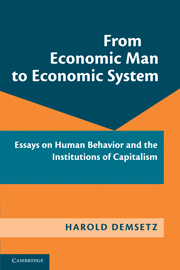Book contents
- Frontmatter
- Contents
- INTRODUCTION: ABOUT THESE ESSAYS
- On Self-Interest
- Capitalism and Its Institutions
- 5 THE LATE ARRIVAL OF CAPITALISM
- APPENDIX: ON THE THEORY OF PRIVATE OWNERSHIP
- 6 OWNERSHIP AND EXCHANGE
- 7 REINTERPRETING THE EXTERNALITY PROBLEM
- 8 FIRMS AND HOUSEHOLDS AS SUBSTITUTES
- 9 THE CONTRAST BETWEEN FIRMS AND POLITICAL PARTIES
- 10 THE PUBLIC CORPORATION: ITS OWNERSHIP AND CONTROL
- 11 CROSSING DISCIPLINARY BOUNDARIES
- References
- Index
11 - CROSSING DISCIPLINARY BOUNDARIES
Published online by Cambridge University Press: 22 July 2009
- Frontmatter
- Contents
- INTRODUCTION: ABOUT THESE ESSAYS
- On Self-Interest
- Capitalism and Its Institutions
- 5 THE LATE ARRIVAL OF CAPITALISM
- APPENDIX: ON THE THEORY OF PRIVATE OWNERSHIP
- 6 OWNERSHIP AND EXCHANGE
- 7 REINTERPRETING THE EXTERNALITY PROBLEM
- 8 FIRMS AND HOUSEHOLDS AS SUBSTITUTES
- 9 THE CONTRAST BETWEEN FIRMS AND POLITICAL PARTIES
- 10 THE PUBLIC CORPORATION: ITS OWNERSHIP AND CONTROL
- 11 CROSSING DISCIPLINARY BOUNDARIES
- References
- Index
Summary
I find some justification in the earlier essays on selfish gene theory, the late arrival of capitalism, and Malthus's population trap for finishing this volume with an essay that departs from the volume's emphasis on human behavior and economic institutions. Here, I comment on interdisciplinary work, giving attention to the condition that makes for success in interdisciplinary work and to the different treatments given to competiton by biology and economics. However, when it comes down to it, this last essay does have a place in the general themes of this book. The academic/scientific specialist, after all, is a member of Homo economicus.
Adam Smith, the father of modern economics, did deal with our topic in The Wealth of Nations (1776), which opens with a discussion of the considerable advantages of specialization. In addition to pointing out the gains in productivity obtainable by relying on specialization, he expressed concerns about what kind of person would emerge from occupations that were intensely specialized. He thought this person would be dull and narrow minded, and he hoped that measures would be taken by society to ameliorate these characteristics. He worried needlessly; increased productivity has allowed for reduction in the hours spent at work, and it has enabled people to engage in other activities, such as travel and reading, that often are quite broadening. And he neglected the advice he gave to policy makers – that they should not imagine that people can be moved about like chess pieces.
- Type
- Chapter
- Information
- From Economic Man to Economic SystemEssays on Human Behavior and the Institutions of Capitalism, pp. 160 - 178Publisher: Cambridge University PressPrint publication year: 2008



